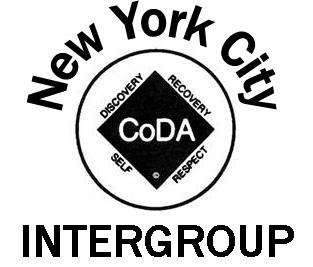 |
A Twelve Step self-help program for Co-Dependents |
| Click on a Step below to see the readings and exercises for that Step. Step 1 Step 2 Step 3 Step 4 Step 5 Step 6 Step 7 Step 8 Step 9 Step 10 Step 11 Step 12 |
CoDependents Anonymous (CoDA) in New York City This web site has been provided by NYC CoDA Intergroup Working the 12 Steps of CoDependents Anonymous (CoDA) © 2005 NYC CoDA Intergroup. All rights reserved. The CoDA 12 Steps and 12 Promises are © Co-Dependents Anonymous, Inc. The Twelve Steps and Twelve Traditions have been reprinted and adapted with permission of Alcoholics Anonymous World Services, Inc. Permission to reprint and adapt this material does not mean that AA has reviewed or approved the content of this publication, nor that AA agrees with the views expressed herein. AA is a program of recovery from alcoholism only – use of the Twelve Steps and Twelve Traditions in connection with programs and activities which are patterned after AA, but which address other problems, does not imply otherwise. Step 9 Co-Dependents Anonymous Step 9: “Made direct amends to such people wherever possible, except when to do so would injure them or others.” Co-Dependents Anonymous Promise 9: “I acknowledge that I am a unique and precious creation.” Suggested Reading CoDA Blue Book pp. 60-64. 12 Step Handbook: Step 9 Chapter, pages 39-42. “CoDA 12 Steps & 12 Traditions Workbook – Steps 7,8,9” : Step 9 is pages 25-28. Exercises These exercises can help you work the 9th Step. In other words, they allow you to get into the feelings and specifics and not just rush through the Step. Keep the task manageable; set safe boundaries for yourself. For example, set aside an amount of time that feels comfortable to you to work the Step at a given time. Keep it simple. Consider “book-ending” with your Step work. Book-ending means telling someone, or your meeting, that you plan to do something, then telling them afterwards that you did it. It can help you show up for yourself. Finally, be gentle, and remember that reading and writing about a Step are an important part of working the Steps, and that working the Steps is itself an amends to yourself. 1. Without editing or over-analyzing, write about “what the 9th Step means to me.” What are “amends”? 2. Review the questions on page 28 of the “CoDA 12 Steps & 12 Traditions Workbook – Steps 7,8,9”. Use any that feel right. 3. What is more important, an “apology” or a change in behavior? Is an amends an event that happens once, or is it something more? What type of amends would you like to receive? 4. Are there amends you’d like to make to God, as you understand God? What might that look like? 5. Why is it important for you to make amends to yourself? How does making amends to yourself help you in making amends to others? Are there qualities you dislike and judge in others that you judge and reject in yourself? How will coming to peace with yourself help you relate to others? 6. Exercise – as suggested on page 62 of the CoDA book, write a letter of amends to yourself, outlining your inappropriate behaviors toward yourself. Consider reading it to yourself, to your inner child, or to your sponsor or another trusted person. What feelings come up as you do this? 7. Making amends to yourself – Remember that “love others as you love yourself” requires you to love yourself. Treat yourself as a child of God. Practice loving yourself in small ways. Prepare affirmations to read to yourself on a regular basis. Allow your new inner voice to guide you to new external actions. Take small, “baby steps.” Be patient with yourself as you practice new behavior. Allow this to be an exciting journey…. 8. Making Amends to others – Can you simply and directly acknowledge your wrongs and then change your behavior toward the people on your list? How would you like to do this? In person? By phone or letter? Is it enough to change your behavior in some cases, making a “living amends”? 9. Are there people on your list who cannot be found or are no longer living? How might you make amends to them? Can you write a letter and read it to God or to a trusted person? Can you be of service to someone else, perhaps someone similar in some way to the person you cannot contact? 10. Will making amends injure the person you’re approaching, or injure you? Consider talking over any sensitive amends with a sponsor, therapist, or other trusted person in your life. Take time to discern, to turn things over to your Higher Power, and to arrive at a loving way to make amends, loving to yourself and to others. Writing a letter and reading it to God, or simply changing your behavior can be helpful ways to make amends. 11. What is the motivation for making each of your amends? Do you have expectations that others will respond in a specific way, that they will be grateful, or that they will change as a result of your amends? How might such expectations get in the way of your recovery? How is this related to the 1st Step? 12. Do you see yourself as a victim of others’ behavior? How is being a victim related to the 9th Step? If you want to be on our email list to receive updates on upcoming CoDA events in New York City, please write to anicko2794@yahoo.com For more CoDA info, go to www.codependentsnyc.org or call 646-289-9954 For more information on the program of CoDependents Anonymous, visit the CoDA World Fellowship web site at www.coda.org |